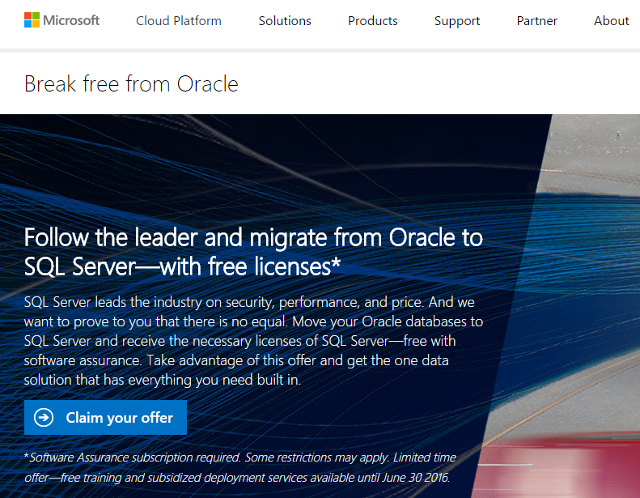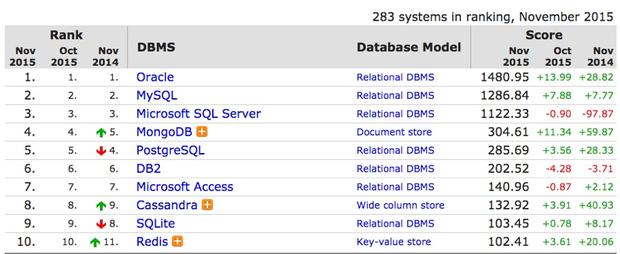
IBM continues to tout their involvement and goals in the healthcare arena. IBM CEO Ginni Rometty was a keynote speaker for the World Health Care Congress and reinforced their progress and aspirations in medical analysis reiterating that cognitive computing is the future of the field.
Seeking Alpha thinks that Oracle’s outlook is less bright due to their overall attitude towards cloud and what that means for their future against competitors.
EMC’s future is looking lighter with new rumors that they are looking to sell off Documentum.
IBM
- What to expect from IBM earnings
IBM had a tough 2015 given the ongoing and heavily time consuming business model transition to cloud. Further, sluggish IT spending particularly on on-premise and data center hardware along with foreign exchange volatility remain added concerns.
We believe that revenues will continue to be affected in the near term as the company is currently transitioning to higher-growth markets that are not yielding enough to offset declines in traditional segments. Also, intensifying competition in the industry is a major headwind.
http://www.marketwatch.com/story/what-to-expect-from-ibm-earnings-2016-04-14
More:
IBM: Revenue Will Be Hurt By Cloud Through 2018, Says Credit SuisseCredit Suisse’s Kulbinder Garcha reiterates an Underperform rating, and a $110 price target, projecting results in line with consensus on top and bottom line.
But Garcha thinks the company will miss its $13.50 earnings goal this year, instead delivering instead $13.30, and “We believe top line won’t stabilize until 2018, with the commentary on Japan tax benefit adding confusion on the EPS guidance.”
- IBM CEO Ginni Rometty: “Cognitive Computing Is the Future of Healthcare”
Importantly, Rometty said, “That invisible data will now be visible. And when you combine those together,” she said, transformative capabilities will be possible. To name just two examples, she noted that “Weather influences asthma. Exposure to crime influences your mental and physical health. This is why we’ve created the Watson cloud,” she noted, adding that “We’ve spent $4 billion to acquire Phytel, Explorys, Merge, Truven, plus the Apple Research Kit,” and other entities, to help fuel the acquisition and analytics of data as part of that broader process.
http://www.healthcare-informatics.com/article/ibm-ceo-ginni-rometty-cognitive-computing-future-healthcare
More:
New IBM partnership will create the ultimate Cancer AdvisorIBM and the American Cancer Society will launch a new partnership to combine IBM’s Big Blue cognitive computing platform (Watson) with the non-profit organisation’s cancer research and patient support services.
Every year 1.6 million Americans are diagnosed with cancer, patients that require accurate information as quickly as possible. Kyu Rhee, the chief health officer of IBM, said: “Watson has read of oncology literature, but this phase is now about learning all the cancer advocacy literature and how to support cancer patients, survivors, and caregivers in their journey.”
http://www.sourcingfocus.com/site/newsitem/9192/
More:
Rometty’s Keynote Speech at the World Health Care Congress:
https://sn.joeylombardi.com/?p=1599 - IBM Scores Server Chip Coup at Google
These efforts over the past few years appear to finally be paying off. On April 6, Google announced that it was co-developing an open server architecture based on IBM’s upcoming POWER9 processors with fellow cloud computing company Rackspace. POWER is now completely supported across Google’s toolchain, allowing Google’s data centers to mix and match Intel’s x86 and IBM’s POWER processors.
POWER9 isn’t due until 2017, but Intel should certainly be concerned.
http://www.fool.com/investing/general/2016/04/12/ibm-scores-server-chip-coup-at-google.aspx
Storage [EMC | Dell | Infinidat ]
- EMC rumored to sell off Documentum
Well, I can only speculate. First of all no one knows for sure whether EMC will actually dispose of Documentum, though I think they will. Whether it’s an existing competitor like IBM, Oracle, or OpenText (who loves complicated tools with recurring maintenance revenues), or a private equity player who acquires them, we will hopefully know soon.
https://www.realstorygroup.com/Blog/2971-EMC-rumored-to-sell-off-Documentum
- EMC Veteran Will Lead Combined Dell-EMC Services Group
The latest news, disclosed in an SEC filing Monday, is that Howard Elias, president and chief operating officer for EMC’s Global Enterprise Services, will be president of the global services and IT unit of the merged company after the deal is complete.
http://fortune.com/2016/04/12/emc-veteran-will-lead-combined-dell-emc-services-group/
- EMC Saying Goodbye To ‘Federation’ Tag, Tries To Reassure Employees Ahead Of Dell Merger
According to a November 2015 ESG survey of midmarket and enterprise customers, 75 percent of customers believe the merger will benefit them, while 17 percent say it will have no impact. About 60 percent said they would increase spending levels as a result of the merger, and 65 percent said they believe the merger will result in more complete and innovative solutions.
Microsoft
- Microsoft just took a big stand against the government over user privacy
Apple isn’t the only company that’s fighting with the government over user privacy these days. Via GeekWire, Microsoft has sued the United States Department of Justice and has asked a court to declare the government’s secrecy orders as unconstitutional. Microsoft says it objects to orders issued by the DOJ that say the company cannot inform customers when law enforcement officials are seeking access to customer information and data.
- Microsoft and Facebook Say They Have No Gender Pay Gap
“Today, for every $1 earned by men, our female employees in the U.S. earn 99.8 cents at the same job title and level,” wrote Kathleen Hogan, executive vice president of human resources for Microsoft in a post on the company’s site. She also shared information about the differences (or lack thereof) in compensation for minority employees, who actually slightly out-earned their white counterparts by 0.004 cents.
Hewlett Packard Enterprise | HP Inc
- HPE the big dog in booming cloud infrastructure market
HPE is currently the runaway market leader after selling $4.55bn (£3.2bn) of kit destined for public or private cloud environments last year, up 27 per cent on 2014.
Dell and Cisco were a distant second and third place on 10.6 and 9.6 per cent market share respectively, compared with HPE’s 15.7 per cent, with EMC and IBM rounding out the top five.
http://www.channelweb.co.uk/crn-uk/news/2454094/hpe-the-big-dog-in-booming-cloud-infrastructure-market
However:
Dell-EMC set to snatch HPE’s crown in $29bn cloud marketAfter Dell completes its acquisition of EMC, the merged company looks set to outstrip Hewlett Packard Enterprise as the top earner in cloud IT infrastructure.
Dell’s and EMC’s combined cloud IT infrastructure revenues for 2015 total $5.3bn, ahead of HP Enterprise’s $4.5bn, according to IDC’s latest vendor revenue figures.
http://www.zdnet.com/article/dell-emc-set-to-snatch-hpes-crown-in-29bn-cloud-market/
Oracle
- Oracle’s Rite Of Passage Has Come
Microsoft and Amazon’s AWS have both been taking steps to snatch business away from Oracle. Of the “Cloud Fource” or “Cloud 4ce” companies (names I’ve coined for the top four players in the cloud space comprising Amazon, IBM, Microsoft and Google (NASDAQ:GOOG) (NASDAQ:GOOGL)), Microsoft and Amazon are taking important steps to wean the world away from Oracle database systems.
http://seekingalpha.com/article/3964707-oracles-rite-passage-come

Other
- Box: It Makes No Sense For Us To Build Data Centers When IBM Can Do It At Scale
“Some parts of our architecture have been on AWS over the years,” Levie said in response to TechWeekEurope’s question. “There was already a lot of familiarity with the platform. The partnership we announced with IBM last June encompasses a lot of things as well as cloud. “We had a bit of headway because of previous work with AWS, but we have a much more significant partnership with IBM.
http://www.techweekeurope.co.uk/cloud/box-zones-cloud-data-centres-189947
- Yes, Badlock bug was shamelessly hyped, but the threat is real
In a nutshell, Badlock refers to a defect in a security component contained in just about every version of the Windows and Linux operating systems. Known as the Distributed Computing Environment/Remote Procedure Call (DCE/RPC), it’s used by administrators around the world to access the most valuable asset on any Windows network—the Active Directory, which acts as a network’s digital security guard, allowing, for instance, an organization’s CFO to log in to an accounting server, while locking out the janitor or the groundskeeper. Because Active Directories enforce security policies and contain password data and other crucial credentials, they are almost always the first asset hackers access once they gain a limited foothold into a targeted network.




